During my visit to Myanmar in mid-November, the latest of many since 2010, I witnessed new layers of complexity in the historical and political forces contributing to the Rohingya crisis. While the plight of the Rohingya population has galvanized international opinion, it has reinforced nationalist sentiment within a large segment of the Myanmar population and has drawn State Counselor Aung San Suu Kyi closer to the powerful military establishment that she has opposed since leading a popular uprising 1988.
As a result, the United States and other Western countries are finding it hard to punish the people who caused the flight of the Rohingya without undermining the transition to civilian rule that began in 2011.
More than 600,000 Muslim people in the self-identified Rohingya community have fled into Bangladesh since late August when Myanmar’s armed forces launched a massive counterterrorist operation against a small group of Rohingya radicals who had attacked some 30 military and police outposts with knives and bamboo spears.
The U.S., other Western governments, the United Nations, and dozens of international NGOs that have supported the remarkable transition to democratic rule in Myanmar since it began in 2011 are struggling to find effective ways to respond to this disaster. Aung San Suu Kyi, the charismatic Nobel Peace Prize laureate who spent 15 years under house arrest before becoming the country’s political leader following national elections in 2015, is at the center of the media stories that have focused world attention on this latest refugee crisis.
“The Lady,” as she is often called, has resisted openly criticizing the Myanmar armed forces for overreacting to the limited Rohingya attacks and has even avoided using the word “Rohingya.” This attitude has appalled human rights advocates around the world, especially after her decades under house arrest for being a champion of human rights and democracy. Western governments are now under considerable popular pressure to impose sanctions on Myanmar, but sanctions could be counterproductive.
Most of the Myanmar population, especially the Buddhist majority, feels that the Rohingya don’t belong in their country. They view the Rohingya as illegal immigrants seeking to convert their Buddhist country into a Muslim country. As a result, new “pro-Muslim” sanctions will be viewed as an external attack on their nation. Already since August, nationalist sentiment in Myanmar has moved in favor of the armed forces and against the quasi-civilian government led by Aung San Suu Kyi (power is shared with the military). Much of her political power derives from the support provided to her by the western democracies over the past 30 years. If she loses this support, her civilian government will be weakened, the transition to civilian rule may stall, and the country could revert to military rule.
The policy dilemma for the U.S. and other Western governments is how to help the Rohingya community without undermining Myanmar’s nascent civilian government. The straightforward solution would be to help the Rohingya return to their homes in Myanmar and live in peace and freedom. Sadly, this solution looks impossible in the near term because of the nationalist sentiment of the Buddhist majority. The most that appears possible is a token return of a few thousand Rohingya confined to several new “villages” with little prospect of enjoying the basic rights of working and traveling freely in Myanmar and outside. It is fundamentally an intractable problem. The odds are high that the Rohingya refugees will remain in Bangladesh in lamentable circumstances for more than five years and possibly much longer.
The emotional case for sanctions is strong, but unless very narrowly defined, sanctions are likely to harm the other 53 million people who live in Myanmar and set back the transition to civilian rule.
The country’s population at large is already suffering from the consequences of the Rohingya crisis. Tourist arrivals are down significantly. Foreign investors are having second thoughts about new projects. Aid agencies have suspended significant activities. Sanctions can only exacerbate these negative impacts on the economy in the short run.
There have been notable economic advances in the past five years and Myanmar’s transition to civilian rule may depend on steady economic progress in the period up to the next national election in 2020.
Success in the transition also depends on other factors, especially ending the civil war with ethnic minorities in the borderlands with China, India, and Thailand. These border conflicts have been relentless since independence in 1948. Another crucial factor is improving “state capacity”—the ability of the government to formulate and implement pro-growth policies.
The lives of most people in Myanmar have improved dramatically since 2010. Their fear of being arrested or having property taken away by the military has almost vanished. Thousands of political prisoners were released. The press is largely free. Mobile phones and internet access have gone from being exorbitant to ubiquitous. Improvements in health services are showing up in better health statistics across the country. Private enterprise is thriving. The education system, neglected for 50 years, is advancing rapidly. The country is one of the poorest in East Asia and will require more than a generation of good governance to catch up with its neighbors.
The U.S. must seek accountability for the abuses against the Rohingya community and provide humanitarian assistance to the refugees in Bangladesh. We must be true to our values. If we react in ways that fuel the resurgent nationalist sentiment, however, we will be shooting ourselves in the foot. It’s a clear case where trying to impose our values is a lost cause. The country could revert to military rule. Or it could simply turn its back on the West and proceed to advance economically with the support of its Asian neighbors who are obviously less concerned about the fate of the Rohingya.
The Brookings Institution is committed to quality, independence, and impact.
We are supported by a diverse array of funders. In line with our values and policies, each Brookings publication represents the sole views of its author(s).
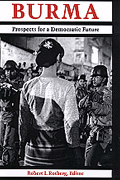
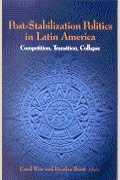
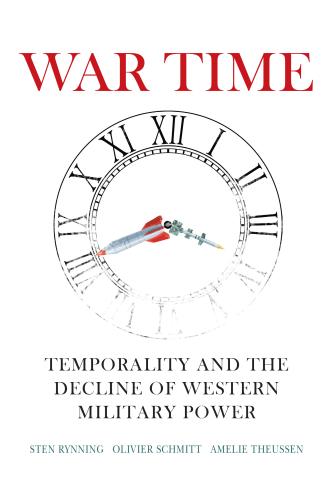
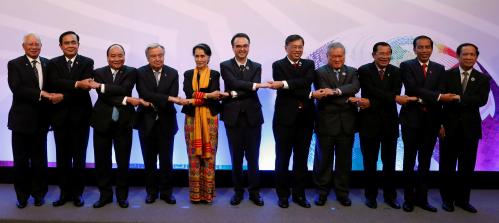
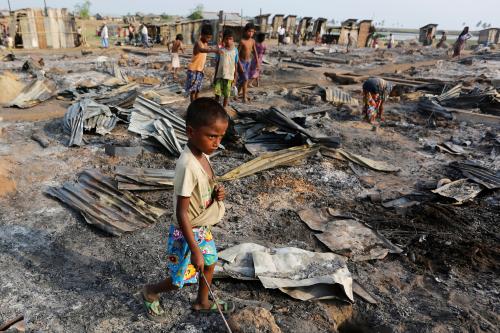
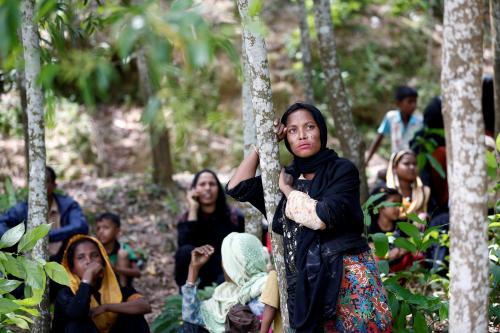

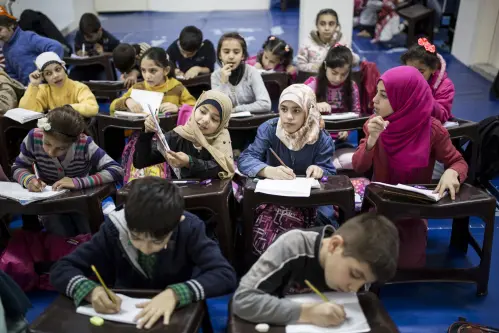

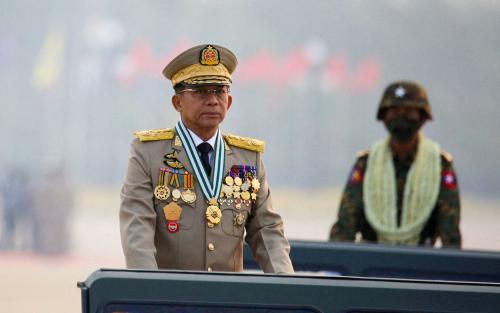
Commentary
On the ground in Myanmar: The Rohingya crisis and a clash of values
November 29, 2017